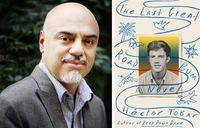TRANSLATION NATION: American Identity in the Spanish-Speaking United States
Hector Tobar, . . Riverhead, $24.95 (307pp) ISBN 978-1-57322-305-8
The nation's growing Hispanic population constitutes a "Latin Republic of the United States," contends this engrossing survey of Latino America. Pulitzer Prize– winning journalist Tobar chronicles the surge in Central American immigrants to a Los Angeles where "Oliver Twist had escaped from London and was now a Spanish-speaking Angeleno in the age of crack"; listens in on the debate among Cuban exiles over Elián Gonzalez; and interviews undocumented migrants about to brave the ferociously defended Tijuana border crossings. He also follows Latinos, and their influence, into the heartland, finding a well-settled immigrant community in Dalton, Ga.; Nebraska corn farmers vying for the tortilla market; and a white Anglo Mormon who reinvents himself as a Mexican deejay for an Idaho Spanish-language radio station. Tobar insists that, thanks to their great numbers and easy access to cultural wellsprings in nearby homelands, Latinos will avoid assimilation. But he struggles to define the self-confident "Latinoness" he believes will "change the course of American history," locating it variously in a supposed resistance to "good, Protestant, money-making order"; a rejection of cultural boundaries; a taste for bright colors; and the iconography of Che Guevara. These don't really amount to the Tocquevillean insights he's aiming for, but Tobar's nuanced reportage vividly conveys the complexity and pathos of the Latino experience.
Reviewed on: 02/21/2005
Genre: Nonfiction
Paperback - 368 pages - 978-1-59448-176-5



